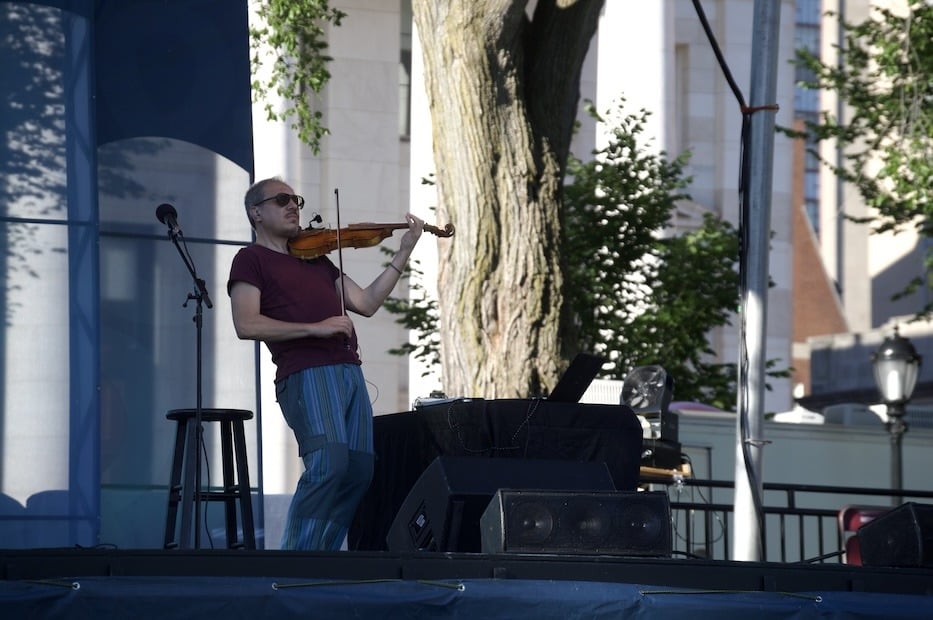
International Festival of Arts & Ideas | Arts & Culture | New Haven Green

Kamini Purushothaman Photo.
“Go Luca, go!” shouted someone in the crowd, encouraging the violinist Luca Ciarla to return to the stage for one final song. He obliged, walking back on as the audience clapped and cheered. The upbeat notes of the composition “Libertango” soon enveloped attendees lounging on the New Haven Green.
Ciarla took the Alexander Clark Stage on the New Haven Green last Thursday for a genre-defying performance at the International Festival of Arts & Ideas. Performing before Bossa Nova singer Caro Pierotto, the performance showcased the violinist’s electronic mastery, vocal talent, and wit. After an introduction by Arts & Ideas board member Patricia Brett, Ciarla greeted the crowd.
“Good afternoon, good evening, buona sera, bonne soirée,” Ciarla said, addressing attendees in English, Italian and French. Foreshadowing the night to come, Ciarla performed music from all three cultures.
An Italian violinist, Ciarla started his musical journey playing piano at eight years old. He grew up in the town of Termoli, Italy, and attended a conservatory before majoring in violin music in college. After completing his degrees at the Fiesole School of Music and the Scuola di Alto Perfezionamento of Saluzzo, he moved to the U.S to pursue further musical studies.
The musician is currently touring in the United States and Canada, and he has performed in over 70 countries.
But Thursday marked Ciarla’s first time in the city of New Haven, and he voiced his appreciation for the green view around him.
“All this nice grass,” he said. “I almost want to move here.”
Alternating between soulful performances and audience engagement, Ciarla kept attendees on their toes as he described his musical interests and tested out various jokes. Ciarla emphasized his diverse musical interests, and his love of musical experimentation soon became apparent.
With a computer by his side to play additional sound effects—like flowing water, rhythmic claps and his own vocals—Ciarla created a multi-layered auditory experience that engrossed listeners. As he played, passersby walking across the green paused to listen to his melodies.
Ciarla made consistent use of the loop pedal, an electronic instrument that records in real time and plays the music back. He learned about the piece of technology through a guitarist friend who owned one, Marco.
“Guitarists are much better with electronics,” he joked, before continuing on with the story. “I said, ‘Marco, may I have it for a few days. I just want to hear what it’s like with a violin. I never gave it back.”
That revelation brought a wave of laughter, to which Ciarla clarified that he eventually paid his friend for the device. With that, Ciarla’s signature improvisational style was born.
Performing an expressive rendition of “Bella Ciao,” his passionate violin-strums wowed attendees. Later, he played “Minor Swing,” a technically-challenging, fast-paced tune that includes multiple chord changes. The song was composed by the jazz guitarist Jean “Django” Reinhardt and violinist Stėphane Grappelli.
Ciarla called the song an example of “Gypsy jazz,” named for Reinhardt’s Romani heritage, but some musicians prefer the term “manouche jazz” because of the derogatory associations of the former name.
Ciarla himself has an extensive background in jazz, which he studied at the University of Indiana with composer David Baker. At his show, he praised modern-day jazz sensation Samara Joy, who had performed in New Haven the previous night.
When he asked the audience if they had attended her concert, they responded with resounding cheers and claps. “[She’s] the greatest thing happening in the music world,” Ciarla said.
Ciarla dedicated much of his concert to uplifting other musicians, present and past. Exploring his love of folk music, he performed a song by cantatour—singer-songwriter— Fabrizio Cristiano De André. André, a native of Genoa, Italy, is little-known in the U.S., but he was one of the most famous Italian songwriters of the late 1900s.
“His name probably doesn't ring a bell,” said Ciarla, eager to expose his audience to a musical style they might not otherwise have learned about.
When Ciarla jested that he was disappointed because he received a standing ovation at all his other concerts, a few enthusiastic listeners stood up to express their enthusiasm.
“Kidding,” he laughed, hyping the audience up for the show’s closing.
Then he transitioned into the song “Via Con Me” by Italian musician Paulo Conte. Mastering the song’s upbeat rhythm, he brought many a smile to concert-goers.
“It’s always a good time to learn Italian,” he joked before attempting to teach the audience some of the song’s lyrics. But rhythmic—and not linguistic—abilities were the skills that proved most useful as Ciarla taught the audience to scat. Soon, a sea of “doo doo” and “ci-boom” echoed across the Green.
As the song ended, Ciarla quietly exited stage-right, leaving those who didn’t catch him whispering to Executive Assistant Clifford Schloss perplexed.
But seconds later, Schloss came on stage with a simple arrangement: “Maybe if we clap enough, he’ll do another song,” he said.
The audience erupted into applause, and soon enough, Ciarla returned for his last hurrah. Finishing out “Libertango” with a humble bow, he clasped his hands together as if in prayer.
“We’ve come to the end,” Ciarla had said before the fake-out. But his eager audience proved his conclusion: “It’s not over yet.”

